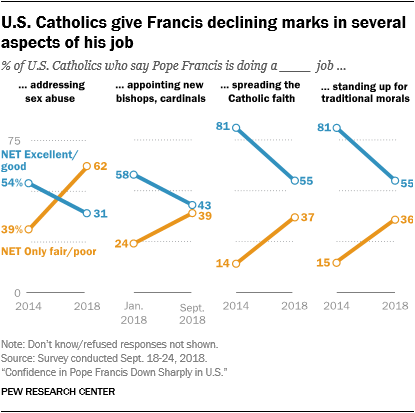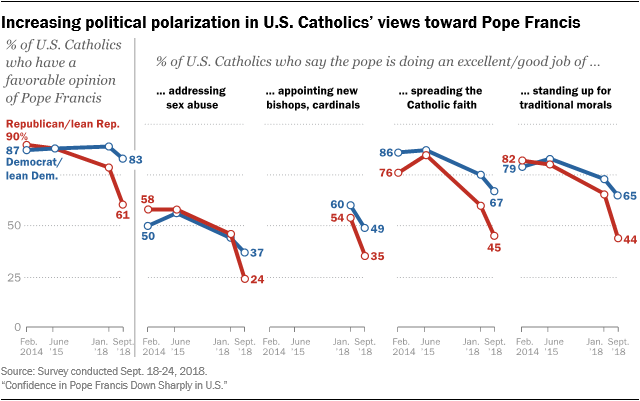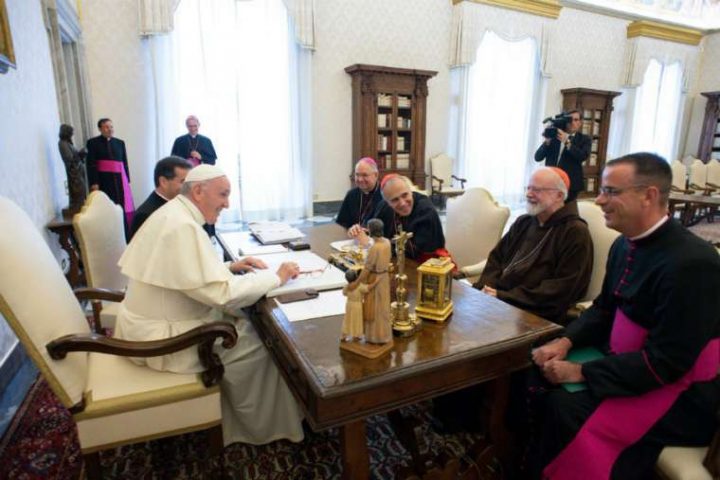Star Parker: Pro-Abortion Left vs. Kavanaugh
October 4, 2018Tim Bennett: Hell Is Real. Stop Pretending It Isn’t
October 4, 2018
By Christine Rousselle, CNA/EWTN News, Oct 3, 2018
 Washington D.C., Oct 3, 2018 / 02:24 pm (CNA/EWTN News) – A recent poll has shown a drop in popularity for Pope Francis in the United States over the past year. The poll suggests that many Americans increasingly disapprove of how the pope has handled the abuse crisis.
Washington D.C., Oct 3, 2018 / 02:24 pm (CNA/EWTN News) – A recent poll has shown a drop in popularity for Pope Francis in the United States over the past year. The poll suggests that many Americans increasingly disapprove of how the pope has handled the abuse crisis.
According to a Pew Research Forum survey conducted in mid-September, fewer Americans, and specifically American Catholics, express favorable feelings about the Roman Pontiff.
The pope has enjoyed a very high favorability rating among Americans, and American Catholics, throughout his pontificate.
Throughout his papacy, Pope Francis has had a net favorable rating among American Catholics of around 80 percent, spiking at a high of 90 percent in February 2015. According to the recent poll, this total stands at 72 percent, his lowest so far.
The sharpest drop in the pope’s numbers were among those who expressed “very favorable” views of him, rather than just “favorable.”

When Pope Francis was elected in March 2013, 43 percent of American Catholics had a “very favorable” view of his pontificate. That number rose to 62 percent in October of 2015, immediately after he visited the United States, but the most recent survey saw just 30 percent of American Catholics reporting a “very favorable” view of the pope.
American impressions of the pope appear to be tied to his percieved handling of the sexual abuse crisis. In February 2014, just under a year into his papacy, Pew found that 54 percent of American Catholics said that Pope Francis was either doing an “excellent” or “good” job of addressing the scandal. That figure stayed relatively the same through 2015, before dropping to just 31 percent last month.
Conversely, at the start of his papacy, 39 percent of American Catholics thought Pope Francis was doing an “only fair” or “poor” job at dealing with the scandal, with 15 percent saying that the pope was doing “poorly.” In September of 2018, that figure had jumped to 62 percent, with the number of people saying they believed the pope is doing “poorly” sitting at 36 percent.
The survey showed that American Catholics are also less positive about other aspects of Pope Francis’ performance, including his work spreading the Catholic faith, appointing new bishops and cardinals, and standing up for traditional values.
Since January 2018, the number of Catholics who think Pope Francis has done an “excellent” or “good” job at spreading the faith and standing up for traditional values has dropped sharply, from 81 percent to 55 percent.
When it comes to appointing bishops, only 43 percent of Americans think the pope is doing an excellent or good job at this, a 15-point drop since the beginning of the year. The percentage of people who think that Pope Francis is doing a “only fair” or “poor” job at this task has risen from 24 percent to 39 percent over the last nine months.
Villanova University Professor and Church historian Massimo Faggioli told CNA he believes there are “many factors” influencing American perceptions of the pope, including the “tragic moment of crisis” gripping the Church in the United States, as well as cultural, political, and ecclesiastical issues.
“There are expectations that the pope acts against bishops and cardinals quickly; but the pope cannot act on the basis of a grand jury report only or of media reports only,” Faggioli told CNA. “There must be a formal investigation or a process.”
Faggioli told CNA that for many people in the United States, used to a rolling newscycle, it was hard to understand why Pope Francis has taken so long to respond to emerging scadnals, such as the 11-page “testimony of former apostolic nuncio Archbishop Carlo Maria Vigano, something Faggioli called “obviously frustrating” for many Catholics.
“The choice of not responding immediately to the Vigano’ report is hard or impossible to understand for many in the US media culture and for those who do not consider the long-term view of the Church in Pope Francis,” Faggioli said.
When faced with a large-scale crisis, it is normal for the leadership of any institution to suffer a backlash. “This is especially true for those who tend to see in the pope the CEO of the Catholic Church,” he told CNA.
“There is also an ecclesial factor: it seems that some US Catholics are blaming pope Francis for not doing what the US bishops should do to address the abuse crisis. The pope cannot act in total disregard of the local episcopate while the USCCB is putting together an action plan.”
Overall, Faggioli warned that the drop in popularity reflected a decline in confidence not only in Francis personally but in the office of pope.
“More importantly, pope Francis’ drop in popularity in the USA is here also a drop in the popularity of the papacy itself as an institution in the USA – also of his predecessors John Paul II and Benedict XVI.”
While timing of the decline in papal popularity would seem correlated to the still-emerging global abuse crisis, Faggioli told CNA that Francis was the subject of “a systematic campaign of undermining coming from US conservatism.”
“The papacy has become now a partisan issue in the US Church like never before – there is an increasing political polarization in the views of US Catholics toward pope Francis, in which the abuse crisis is a very important element but that element must be seen in the context of a growing distance between Rome and US Catholicism.”






 Washington D.C., Oct 3, 2018 / 02:24 pm (CNA/EWTN News) – A recent poll has shown a drop in popularity for Pope Francis in the United States over the past year. The poll suggests that many Americans increasingly disapprove of how the pope has handled the abuse crisis.
Washington D.C., Oct 3, 2018 / 02:24 pm (CNA/EWTN News) – A recent poll has shown a drop in popularity for Pope Francis in the United States over the past year. The poll suggests that many Americans increasingly disapprove of how the pope has handled the abuse crisis.